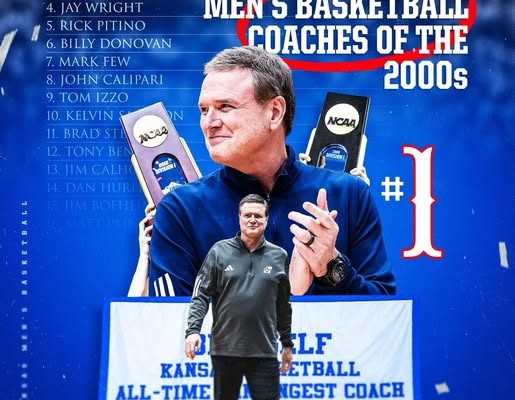There are certain eras in college basketball that will forever be defined by a coach, a team, a culture, or a championship run. The 1980s had Bob Knight and his combative genius at Indiana. The 1990s belonged to Mike Krzyzewski and the reign of Duke’s blueblood dynasty. But when it comes to the 2000s, no figure has better embodied the era, no coach has risen more consistently to the moment, and no program has been more consistently elite under a single leader than Bill Self at the University of Kansas. His name might not always grab headlines with flashy quotes or viral antics, but in the realm of success, longevity, consistency, and championships, Coach Self stands alone as the definitive face of 2000s college basketball.
Bill Self arrived at Kansas in 2003, taking over one of the most storied programs in the history of the sport. The task ahead of him was massive: uphold the legacy of Phog Allen, Larry Brown, Roy Williams, and James Naismith himself. Most coaches might crumble under that kind of pressure or spend a decade merely trying to maintain the status quo. Self did far more than that—he redefined what excellence looked like at Kansas and, by extension, in all of college basketball. Over the next two decades, Self transformed the Jayhawks into the most dominant regular-season force in the sport and managed to punctuate that with postseason glory.
From the moment he took the reins at Kansas, Self began stacking Big 12 titles like a seasoned dynasty builder. Between 2005 and 2018, Kansas won 14 consecutive regular-season Big 12 championships under Self, a streak that remains one of the most mind-blowing feats in all of sports. It wasn’t just dominance—it was sustained brilliance in a power conference. Other elite coaches like Tom Izzo, Coach K, Jim Boeheim, and John Calipari had amazing seasons and even championship runs, but none maintained Self’s level of excellence in the regular season year after year with new rosters and evolving challenges.
His ability to adapt to the changes of the modern game has been another key factor in cementing his place as the face of the 2000s. From developing four-year players to integrating one-and-done stars and even embracing the transfer portal in recent years, Self has shown that great coaching isn’t about adhering to a system—it’s about evolving without ever compromising the culture of accountability and execution. His teams are known for playing smart, physical defense, running seamless offensive sets, and never beating themselves with unforced errors. The “Bill Self System” isn’t about gimmicks or flare—it’s about building grown men who compete hard, share the ball, and know how to win.
Winning, of course, is the truest metric in sports, and Self’s record is nearly unmatched. With multiple Final Four appearances, two national championships (2008 and 2022), and countless deep March Madness runs, Self has proven he knows how to navigate the most chaotic and pressure-packed month in college basketball. His 2008 title run, punctuated by Mario Chalmers’ iconic three-pointer in the final seconds of regulation against Memphis, was a moment that defined the sport. The 2022 championship was perhaps even more impressive, as it came after a period of significant adversity for both the program and the coach himself—yet Kansas still cut down the nets, proving Self’s staying power across multiple basketball generations.
To fully understand his place as the most decorated coach of this era, one must also consider the context of what he’s done compared to his contemporaries. Krzyzewski had his legendary moments, but his dominance started in the 1990s and slowly waned by the 2010s. Calipari’s meteoric rise at Kentucky was flashy and impactful, but he never matched Self’s consistency. Tom Izzo built a fortress at Michigan State and reached multiple Final Fours, yet still only has one national title and didn’t maintain the regular-season dominance of Kansas. Coaches like Jim Calhoun, Roy Williams, and Jay Wright all had periods of greatness, but none have matched the sustained excellence of Self’s body of work. Self’s Kansas has never missed the NCAA Tournament when eligible under his leadership, and that kind of reliability is nearly unheard of in this day and age.
What makes his dominance even more remarkable is how quiet and methodical it has been. While the sport was filled with larger-than-life personalities and sideline theatrics, Self’s approach has always been defined by steadiness and substance. He doesn’t chase media attention or controversy. He doesn’t fall into coaching fads. He wins. He wins with discipline, with smart scouting, with precise execution, and with complete control of the locker room. The players he coaches become better, and many go on to have successful professional careers—some in the NBA, others overseas—but all of them leave Kansas understanding what it means to compete and lead.
Self’s influence also extends beyond the scoreboard. At a time when college basketball has been pulled in a thousand directions—by the NBA draft, NIL, transfer rules, and conference realignment—Self has kept Kansas both relevant and principled. He has managed to balance recruiting top talent while still maintaining a developmental pipeline of future stars. His teams don’t just win; they represent what’s best about the college game. That’s not an accident. That’s culture. That’s coaching.



